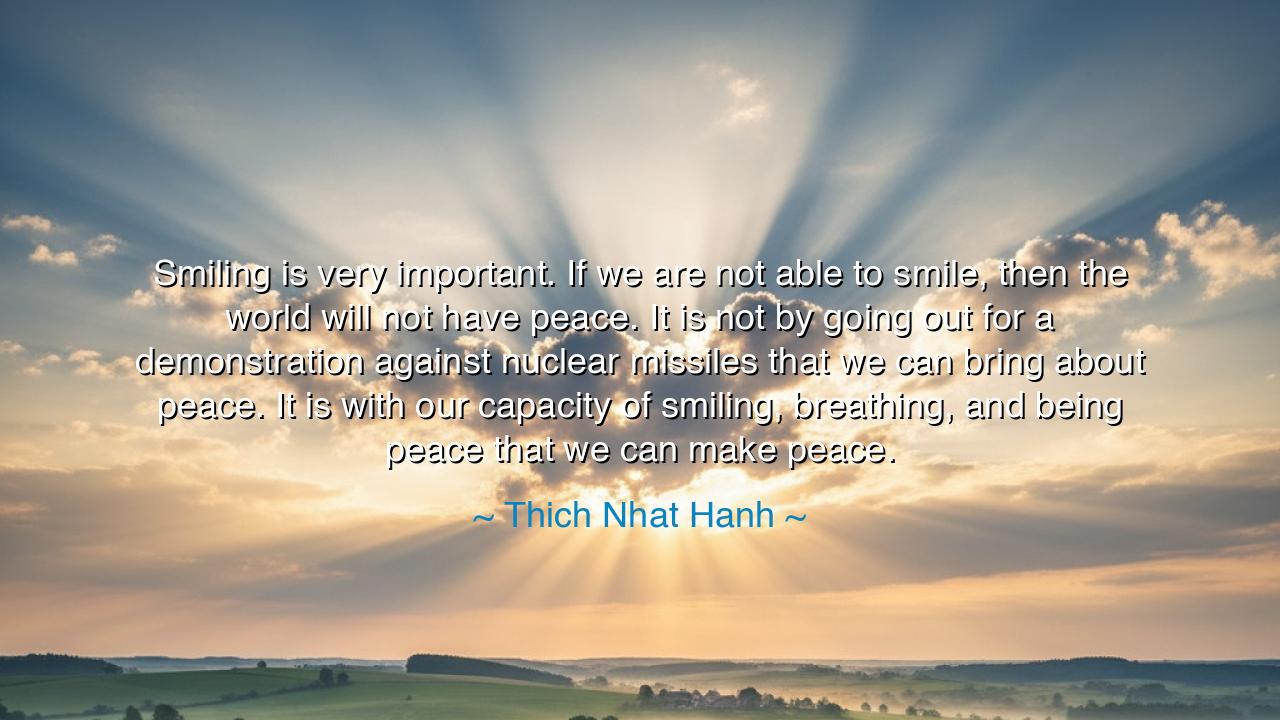
Smiling is very important. If we are not able to smile, then the
Smiling is very important. If we are not able to smile, then the world will not have peace. It is not by going out for a demonstration against nuclear missiles that we can bring about peace. It is with our capacity of smiling, breathing, and being peace that we can make peace.






Hear the gentle yet thunderous words of Thich Nhat Hanh, the monk of Vietnam, who taught the world with silence and with breath: “Smiling is very important. If we are not able to smile, then the world will not have peace. It is not by going out for a demonstration against nuclear missiles that we can bring about peace. It is with our capacity of smiling, breathing, and being peace that we can make peace.” At first, these words may seem fragile, too soft to stand against the weapons of war. Yet in them lies a wisdom more enduring than iron, more powerful than armies, for they point to the origin of all true peace: the heart of the human being.
For what is a smile, if not the most universal language of humanity? The child knows it before speech, the elder gives it after words fade. It is the outward sign of inward serenity, the flame that says, “Here is no enemy, here is no threat, here is only shared humanity.” Thich Nhat Hanh teaches that to smile is to disarm, first within ourselves and then in the hearts of others. A march may shake governments, but a single true smile can begin to heal the world.
The ancients also knew this truth. Consider the Buddha, who sat beneath the Bodhi tree until enlightenment dawned. His gift to the world was not a sword nor a decree, but the serene smile of one who had conquered himself. Or recall St. Francis of Assisi, who walked into the camp of the sultan during the Crusades, carrying no weapon but his gentle presence. He did not win a battle of armies, but a moment of peace was born because he embodied peace. The lesson resounds: peace is not imposed from without, but cultivated from within.
Thich Nhat Hanh’s life itself is proof of these words. He was exiled from his homeland, denounced by governments, and surrounded by the roar of war. Yet he carried himself with a calm demeanor, teaching his students to walk slowly, to breathe deeply, to smile in the midst of chaos. He believed that true resistance was not fueled by anger, but by the living practice of compassion. To him, even the protest against nuclear weapons was empty if the protester carried hatred in his heart. For how can one demand peace while burning with violence within?
This teaching is no denial of the horrors of the world. Thich Nhat Hanh knew war, exile, and suffering. Yet his wisdom was that shouting at darkness cannot create light—only light itself can. To smile, to breathe, to embody peace is not weakness, but the highest form of resistance. It is the courage to refuse to mirror the hatred of the world, and instead to radiate the one force that hatred cannot defeat.
Consider also the story of Nelson Mandela, who emerged after twenty-seven years in prison, not hardened with bitterness, but with a heart ready to reconcile. He met his enemies not with vengeance, but with the quiet strength of forgiveness and dignity. This, too, was a form of smiling in the face of suffering. And through it, he preserved a nation from collapse. His strength lay not in weapons, but in the ability to embody peace even when denied it.
Therefore, O seeker, take this lesson into your life: do not wait for peace to arrive from governments or decrees. Begin with yourself. Practice smiling, not as false cheer, but as a reminder to yourself and to others that peace is possible here and now. Breathe deeply when anger arises, so that you do not add to the world’s violence. When you meet another, let your presence radiate calm, so that they may feel a moment of peace in your company. These small acts, multiplied, weave the great fabric of harmony that nations long for but seldom find.
Thus the teaching of Thich Nhat Hanh becomes a command for generations: if you wish to end wars, begin with the war inside yourself. If you wish for the world to smile, first carry the smile upon your own lips. If you wish for peace, be peace. For no demonstration, no law, no army can bring what only the human heart can give. And once given, it endures beyond kings, beyond missiles, beyond death itself.






AAdministratorAdministrator
Welcome, honored guests. Please leave a comment, we will respond soon